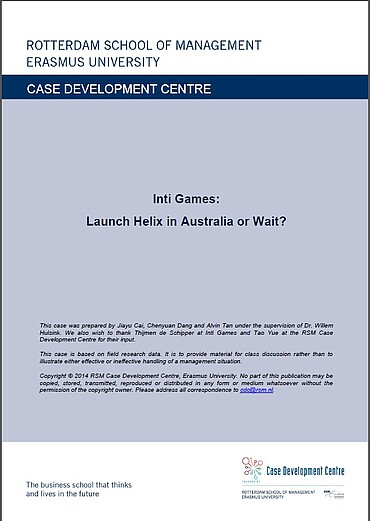description
Inti Games plans to sell its outdoor sports product, Helix, to Australia after successfully selling it on the Dutch home market. Problematic production issues in China have derailed the plan. Inti Games do not wish to lose the Australian market to competitors by delaying product delivery, nor do they wish to damage their reputation by introducing defective products to the market. Is there a viable solution?
Citation Note
Based on field research; 10 pages.
Follow the 'handle' link to access the Case Study on RePub.
For EUR staff members: the Teaching Note is available on request, you can contact us at rsm.nl/cdc/contact/
For external users: follow the link to purchase the Case Study and the Teaching Note.
Abstract
Helix is Inti Game, a Rotterdam-based start-up’s innovative outdoor sports product. After successfully selling Helix on the Dutch home market, Inti Games planned to expand internationally, with Australia being the first market to enter and with U.S. and U.K. in the pipeline. They had signed a major contract with an Australian distributor who was keen to introduce Helix there. A successful sale in Australia would lay the foundation for future moves into the other key English speaking markets. However, problematic productions in China derailed the plan. As the scheduled product launch date was approaching, the products at Chinese factories were only 80% completed and their quality not yet established by test runs. The two founders of Inti Games – De Schipper and Van Rijn – did not wish to lose the Australian market to competitors by delaying product delivery, nor did they wish to damage Helix’s or Inti Game’s reputation by introducing defective products to the market. They had to make a quick decision regarding whether to launch Helix in Australia or wait till next year.
